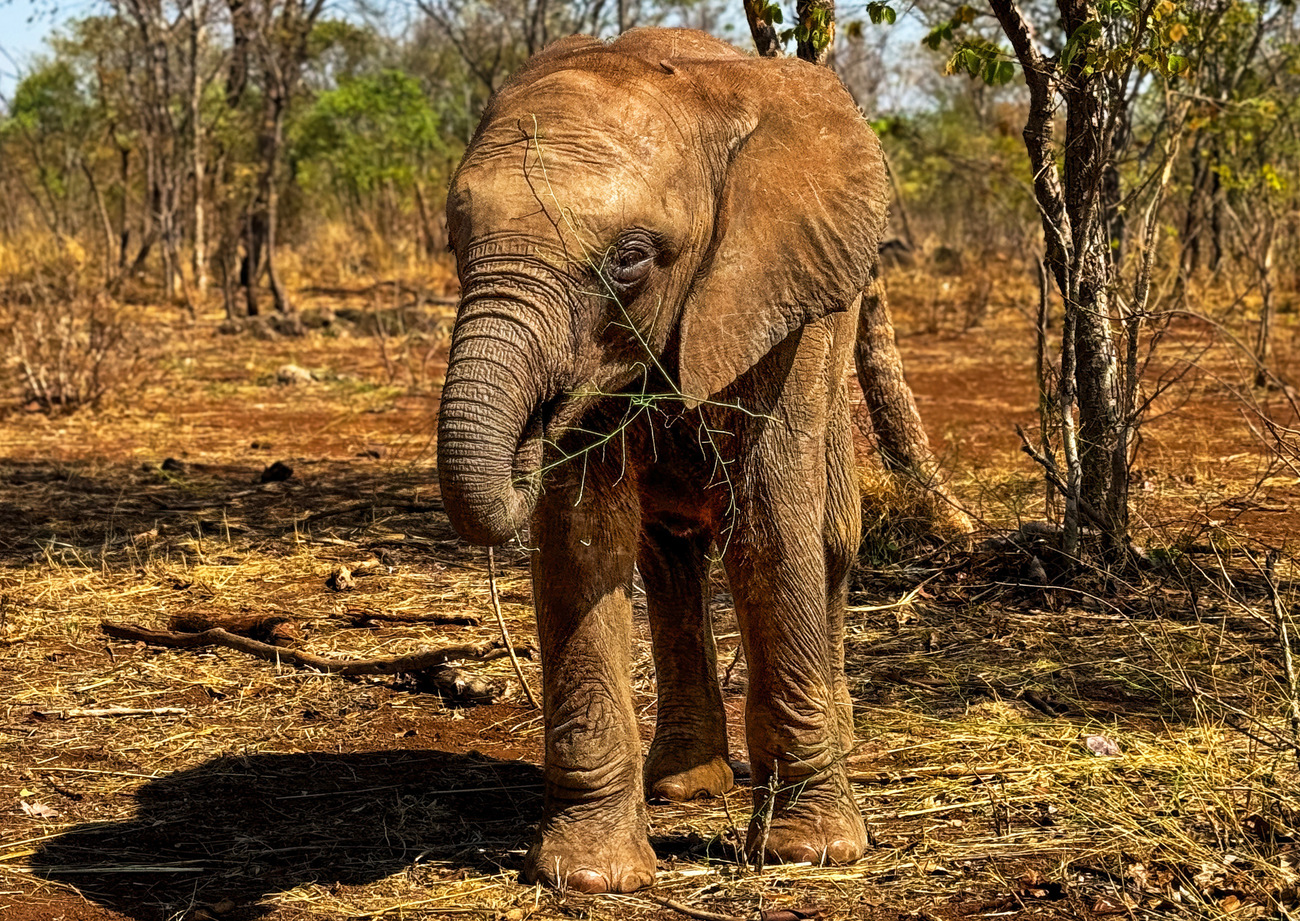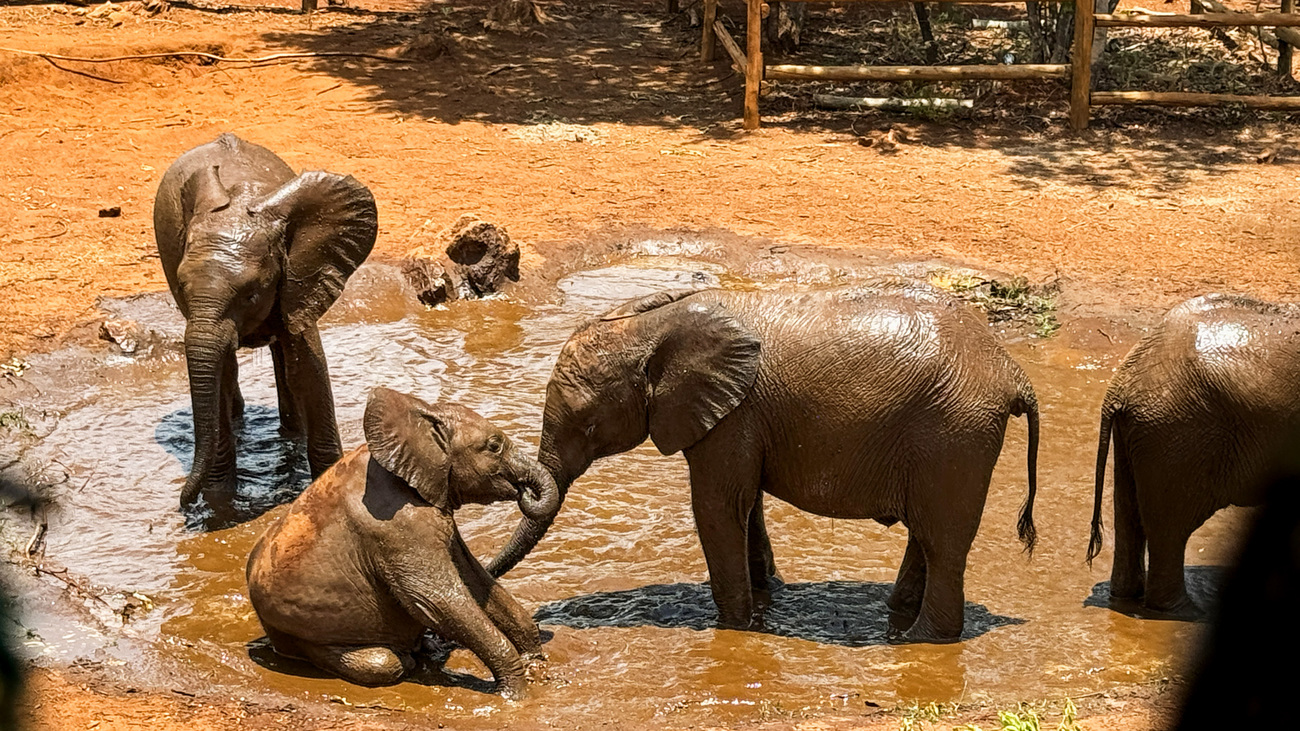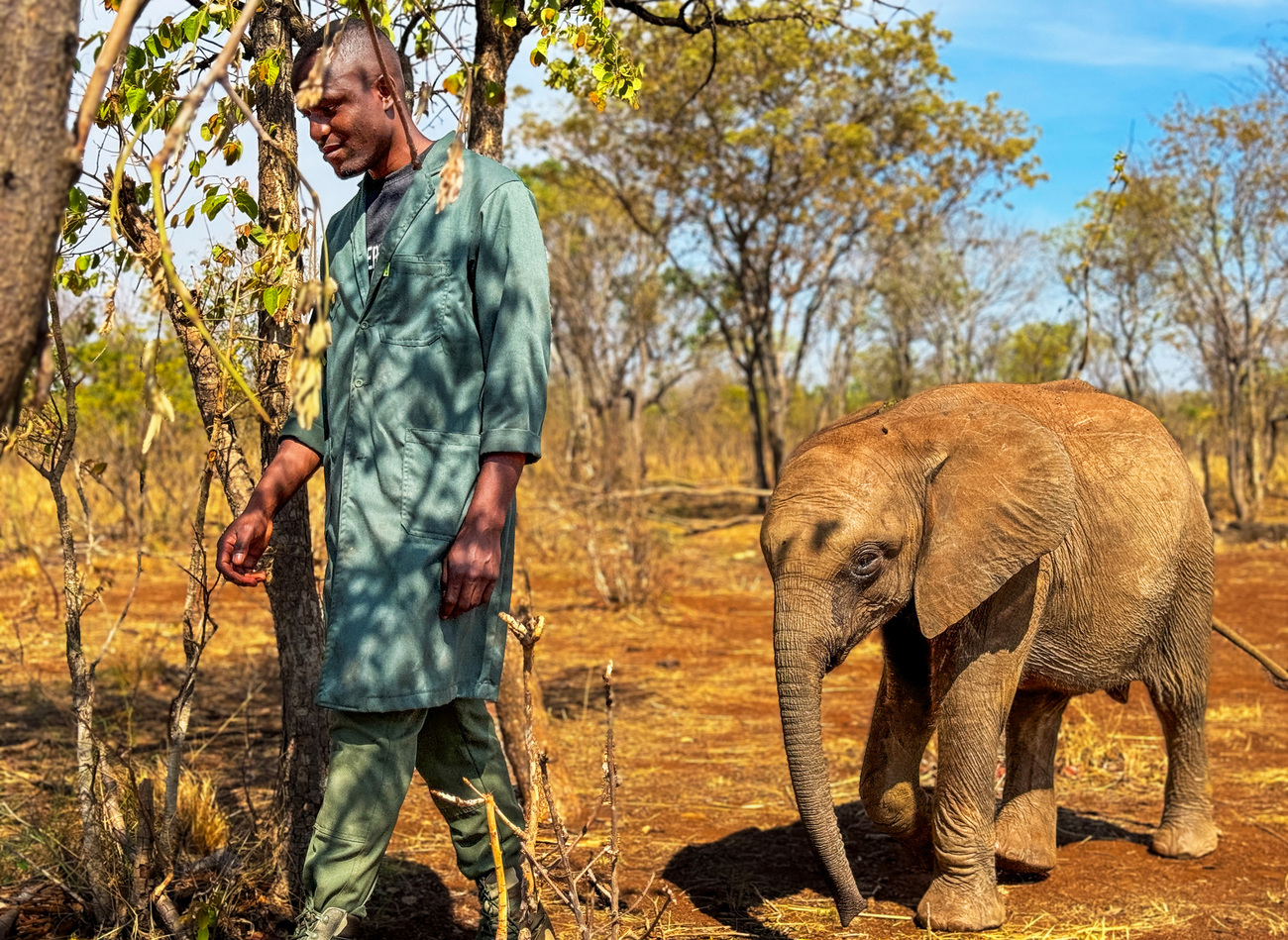Lusaka Elephant Nursery - Zambia
Orphaned elephants need a new herd and a new homeRoom to Roam gives Kasungu the elephant calf a second chance
Room to Roam gives Kasungu the elephant calf a second chance
By Zanji Valerie Sinkala, writer based in Lusaka, Zambia
At five weeks old, a tiny elephant calf became separated from his herd due to human-wildlife conflict between communities bordering Kasungu National Park and elephants who had moved across open community land, raiding the crops of local farms. Such conflict occurs more frequently as more people establish farms in areas where wildlife roam freely.

In an attempt to chase the elephants away, two small calves were left behind, and rangers were unable to re-unite them with their herd. Small, scared, and unable to survive on his own, one of the calves, Kasungu, was rescued by IFAW’s partner Game Rangers International (GRI).
Rescuing an elephant calf isn’t easy—in this case, it required airlifting, and in addition to providing formula, sedation, and the care of handlers and veterinarians, the costs can add up. Where possible, most rescues are conducted within 48 hours of the calf being spotted. This challenging process is made possible thanks to the hard work of GRI’s rangers and the support IFAW is able to provide.
Named after Kasungu National Park, located on the Malawi–Zambia border, this young elephant was placed in the gentle hands of his new caretakers at the Lusaka Elephant Nursery in January 2024. Here, he got a second chance at life.
Settling in with a special diet
‘When Kasungu arrived, he was so fragile,’ says Mathews Shachishu, one of his primary keepers at the Lusaka Elephant Nursery, based close to Zambia’s capital city. ‘He’d look up at us with big eyes, eager to eat whatever we offered. But we had to ensure he got what he needed to grow strong.’
Taking care of a baby elephant is no small task. Each bottle is specially mixed to suit the calf’s needs, and for Kasungu, that meant a blend of powdered milk with moringa, coconut powder, and oats. Every day, Mathews and his team carefully prepare Kasungu’s formula, starting with a bit of hot water, stirring in the ingredients, and cooling it to just the right temperature.
But a few days after his arrival, Kasungu suddenly stopped drinking. ‘He just…lost interest in food,’ Mathews says. ‘We tried everything—adjusting his formula, staying up through the night to check on him. We were so worried.’
After several long days and sleepless nights, Kasungu began drinking again, returning to his bottles with the same enthusiasm he’d had when he first arrived. ‘It was like he decided he wasn’t giving up on us,’ says Mathews, smiling. ‘We fought for him, and he fought to stay alive. Kasungu was back, and we were so relieved.’
Making friends and finding his place
Kasungu’s stable is a cosy shelter, and every night, he sleeps beside the two-and-a-half-year-old female elephant Chikumbi, who has become his mother figure at the nursery. Elephants are naturally social creatures, and companionship is essential for a young one like Kasungu, who is now 10 months old. Chikumbi has stepped in as a protective presence, guiding him through the ups and downs of nursery life.
‘He’s a curious little guy.’ Mathews laughs. ‘Every day, he picks which one of us he wants to feed him.’
Kasungu’s playful personality shines even more during his favourite part of the day—mud bath time at noon. He splashes around, rolls in the mud, and covers himself in dust, all while showing off his newfound confidence. ‘Watching him play is entertaining,’ says Mathews. ‘He’s come so far from being the fragile calf who first arrived here.’

Living with elephants: a challenge for communities
Kasungu’s story, however, is just one small piece of a much more significant challenge. In Zambia and Malawi, human-elephant conflict is an ongoing struggle and the biggest challenge conservation is facing in today’s time. With more agriculture occurring on formerly wild land, elephants and other wildlife more frequently come into dangerous contact with people. Elephants get attracted by crops such as maize and wander into farmlands in search of food and water, leading to dangerous, sometimes deadly interactions for people and elephants.
‘People here depend on their crops to survive,’ explains Wilson Chinda, communications officer at Game Rangers International. ‘So, when elephants come through and damage everything, it’s heartbreaking. But it’s also heartbreaking to see these amazing animals suffer because of it.’
That’s where IFAW’s Room to Roam initiative comes in. IFAW is working to create safe, connected landscapes where elephants and other wildlife can move freely while minimising dangerous interaction with people living close to wildlife. Room to Roam seeks to enhance connectivity between protected areas, securing safe spaces that let elephants like Kasungu have natural habitats to thrive, while supporting wildlife-friendly livelihoods and helping communities coexist with wild animals, with tailored and creative approaches. For example, we’ve helped communities in Malawi install beehive fences to keep elephants away and also earn an income through beekeeping. We are also advancing wildlife-friendly, climate-smart agriculture in the Malawi–Zambia Transfrontier Conservation Area (TFCA), supporting a project that helps 5,000 farmers adopt techniques such as cultivating legume crops that enrich the soil. Not only do these projects help prevent conflict between people and elephants, but they also help people earn income from livelihoods that are more beneficial to the planet.
The Lusaka Elephant Nursery is a project of Game Rangers International (GRI), IFAW’s partner in helping rescue, rehabilitate, and eventually release elephants back into the wild in Zambia’s vast Kafue National Park. The rescue, rehabilitation, and release of young elephant calves is a key part of Room to Roam, as saving the lives of individual elephants is paramount to protecting the whole species.
Looking ahead for Kasungu

Today, Kasungu’s future looks bright. With his keepers by his side and Chikumbi’s steady presence, he’s learning the social skills he’ll need to join a herd of wild elephants someday. His playful nature, love for his keepers, and boundless energy make him a favourite at the nursery.
‘Kasungu’s story reminds us that humans and wildlife can share this land,’ Mathews emphasises. ‘We need to work together.’
Kasungu’s journey is one of resilience, second chances, and deep connections that bridge the gap between humans and the wild. For the communities around him, his story is a hopeful reminder that peaceful coexistence is possible—if we’re willing to put in the work to make it happen.
Related content
Every problem has a solution, every solution needs support.
The problems we face are urgent, complicated, and resistant to change. Real solutions demand creativity, hard work and involvement from people like you.